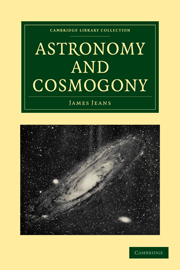Book contents
- Frontmatter
- Contents
- LIST OF ILLUSTRATIONS
- PREFACE
- CHAP. I The Astronomical Survey of the Universe
- CHAP. II The Light from the Stars
- CHAP. III Gaseous Stars
- CHAP. IV The Source of Stellar Energy
- CHAP. V Liquid Stars
- CHAP. VI The Evolution of the Stars
- CHAP. VII Non-spherical Masses–Dynamical Principles
- CHAP. VIII The Configurations of Rotating Liquid Masses
- CHAP. IX The Configurations of Rotating Compressible Masses
- CHAP. X Rotation and Fission of Stars
- CHAP. XI The Evolution of Binary Systems
- CHAP. XII The Ages of the Stars
- CHAP. XIII The Great Nebulae
- CHAP. XIV The Galactic System of Stars
- CHAP. XV Variable Stars
- CHAP. XVI The Solar System
- CHAP. XVII Conclusion
- Index of Subjects
- Index of Names
CHAP. XVII - Conclusion
Published online by Cambridge University Press: 07 September 2010
- Frontmatter
- Contents
- LIST OF ILLUSTRATIONS
- PREFACE
- CHAP. I The Astronomical Survey of the Universe
- CHAP. II The Light from the Stars
- CHAP. III Gaseous Stars
- CHAP. IV The Source of Stellar Energy
- CHAP. V Liquid Stars
- CHAP. VI The Evolution of the Stars
- CHAP. VII Non-spherical Masses–Dynamical Principles
- CHAP. VIII The Configurations of Rotating Liquid Masses
- CHAP. IX The Configurations of Rotating Compressible Masses
- CHAP. X Rotation and Fission of Stars
- CHAP. XI The Evolution of Binary Systems
- CHAP. XII The Ages of the Stars
- CHAP. XIII The Great Nebulae
- CHAP. XIV The Galactic System of Stars
- CHAP. XV Variable Stars
- CHAP. XVI The Solar System
- CHAP. XVII Conclusion
- Index of Subjects
- Index of Names
Summary
Now that the detailed discussion of particular problems is ended, we may perhaps attempt to summarise our results and tentative conclusions, sacrificing logical and chronological order in favour of the arrangement which offers the broadest and simplest view of the whole subject.
The easiest part of the problem of cosmogony is the interpretation of the observed shapes of astronomical bodies and formations. Here the effects of rotation have proved to be of primary importance. The earth and many of the planets have the shape of flattened oranges. The degree of flattening is such as would be produced by quite slow rotation about an axis, and there is no room for doubt that this is the actual cause of the observed flattening. It is possible to trace out theoretically the shapes assumed by astronomical bodies having all possible amounts of rotation. Mathematical investigation shews that the flattened-orange shape is assumed by all bodies in slow rotation, no matter what their internal constitution and arrangement may be, but that with more rapid rotation the shape depends on the internal arrangement of the body, being especially affected by the extent to which its mass is concentrated at or near its centre.
Two special and quite extreme types of arrangement have been considered in detail. In the first the body is supposed to consist of matter which cannot be compressed and is of uniform density throughout; to fix our ideas, we may think of a mass of water.
- Type
- Chapter
- Information
- Astronomy and Cosmogony , pp. 411 - 422Publisher: Cambridge University PressPrint publication year: 2009First published in: 1928

